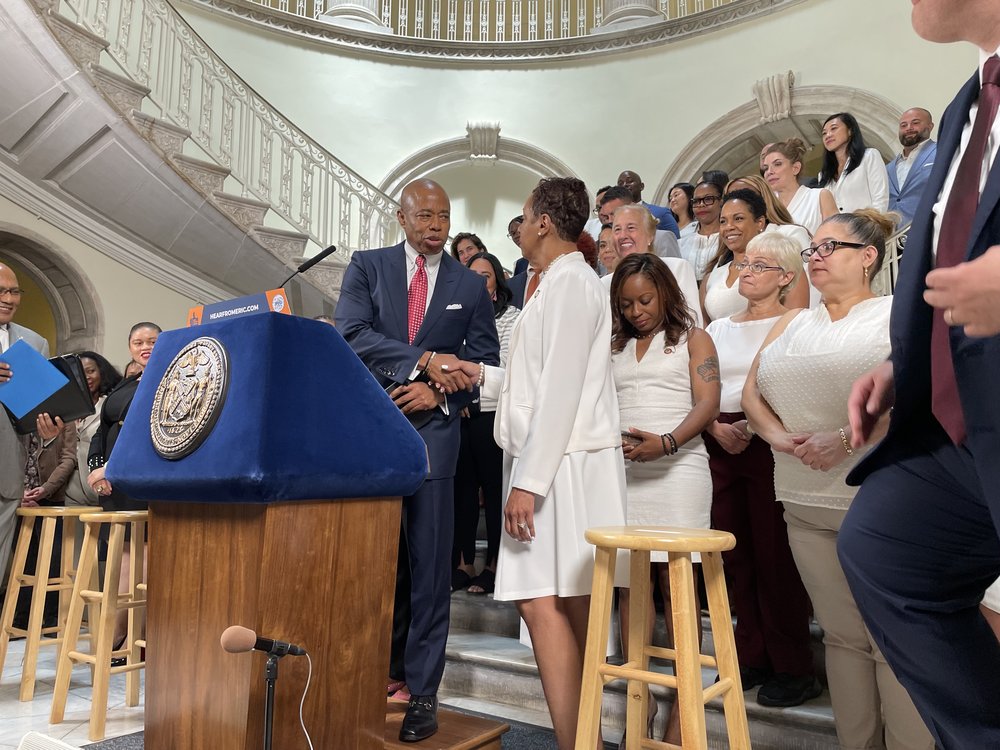NYC Council estimates $3B more in revenue for upcoming fiscal year
March 3, 2024, 6 a.m.
Budget hearings begin this week and councilmembers say the mayor's office has vastly underestimated revenues.

The City Council is kicking off budget hearings this week and the arguments over money are already underway.
The New York City Council says Mayor Eric Adams underestimated tax revenues for the current and upcoming fiscal years by more than $3 billion, as budget hearings get under way this week at City Hall.
That means the city would have a surplus of more than $1.3 billion for the current fiscal year, according to the Economic Tax and Revenue Forecast report released by the Council on Sunday.
The Council’s projection of a 3.3% growth rate for the city’s tax revenue more closely matches the 3.1% growth rate forecast by the Independent Budget Office. Both rates surpass the 2.2% rate predicted by the mayor’s Office of Management and Budget.
The contrast in anticipated revenue comes on the heels of additional cuts to migrant-related spending by Adams, who in late February said that his administration would suspend an anticipated third round of cuts to city agencies due to better-than-expected revenues and an additional 10% spending cut on newly arrived migrants.
Some elected officials and progressives have repeatedly questioned the mayor’s numbers as justification for cuts to city services. The emergence of projections for the city coffers from outside of the mayor’s office challenges the administration's earlier assumptions.
Education cuts in particular threaten to damage the mayor politically. Adams has not been polling well of late — specifically around pre-K and 3-K funding, Politico recently reported.
When asked where the Council might direct its spending in light of the surplus, Councilmember Justin Brannan, the finance committee chair, singled out education and libraries as potential focus areas.
"Early childhood education — 3-K, UPK, all the way to CUNY — to our cultural sector, our libraries," he said. "I think stronger than expected tax revenues allow us to restore these cuts and then we can build from there. So, I think that's what you'll see the Council focusing on."
The Council estimates that the surplus for the next fiscal year, which begins in July 2024, will be even bigger, at more than $3.5 billion.
“The difference is driven mainly by stronger personal income, business, property, and sales taxes,” the report states, referring to the gap between the mayor’s tax revenue projections and the Council’s.
Liz Garcia, a spokesperson for Adams, did not comment on the tax revenue estimates in the City Council report — but said in a statement the mayor's team "was able to make the strong fiscal decisions to navigate us to prosperity." .
"Multiple internationally-recognized, independent experts agree that our robust fiscal management stabilized the budget and improved the city’s economic and fiscal outlook, and even the state comptroller recently recognized the city’s improved economic and fiscal outlook under our watch," Garcia said.
Collectively, the Council’s estimated tax revenues for fiscal years 2026 through 2028 outpace the mayor’s by more than $13.6 billion, with the biggest difference in projection being in fiscal year 2028.
But the Council’s outlook is far from rosy. It notes slower tax revenue growth compared to the last decade and factors that could affect its predictions, like the potential for office vacancy rates to worsen and dim the city’s overall prospects.
“The national and city economic prospects have improved,” the report reads. “However, the lagged effects of higher interest rates will keep economic growth below its long run average.
Bahar Ostadan contributed reporting.
This story was updated with comments from a spokesperson for Mayor Eric Adams.
NYC faces ‘difficult choices’ to meet new class size mandates, education officials warn NYC wastes millions of dollars on no-bid migrant contracts, comptroller audit says